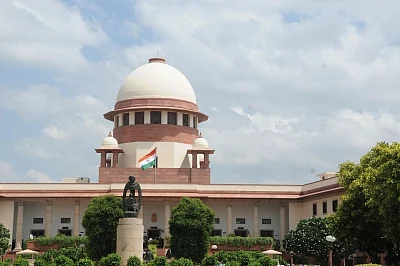New Delhi, March 6 (IANS) The Supreme Court on Tuesday asked the Centre if it intends to set up an independent body for determining a hike in the salary, allowances and pension of existing and former members of Parliament (MPs)."Is there any proposal to set up an independent body to decide salary, allowances and pension of members of Parliament," asked Justice Sanjay Kishan Kaul, who along with Justice J. Chelameswar, is hearing a plea challenging the grant of pension to former MPs.The poser from the apex court bench came as it referred to media reports about a proposal to set up an independent body to determine the hike in salary, allowances and pension of the lawmakers every five years.The court wondered if the proposal to set up an independent mechanism was still on the table or it had been given up.Referring to the procedure being followed for periodic increase in the salaries and allowances of the MPs, Attorney General K.K. Venugopal referred to the proposal in Finance Bill 2018-2019, which provides for automatic revision in salaries, constituency allowances and office expenses of the MPs every five years and linking the hike with inflation index.The court's poser on the independent body came in the course of hearing of two petitions by NGO Lok Prahari and Association of Democratic Reforms (ADR), who have challenged the constitutional validity of the provision of the Salary, Allowances and Pension of Members of Parliament Act, 1954, allowing the grant of pensions to former MPs.As the petitioners hammered on the meaning of the word pension as it is understood in the context of employer-employee relationship, the bench said much emphasis should not be laid on the word pension as it could have been called by any other word like "compensation for the past services" rendered by the former lawmakers."It is not the nomenclature that is important," Justice Chelameswar said, pointing out that "it is in the wisdom of Parliament and we can't sit in judgement on the wisdom of Parliament".Making it clear that it could only look into administrative action of the government, Justice Chelameswar said the top court had consistently maintained that it would not interfere with each and every act of Parliament.Observing that he did not see anything "morally" and "legally" wrong in giving pension to former lawmakers, Justice Chelameswar said: "A lot of them have dedicated their whole life. I don't find it objectionable, morally and legally, giving them perks like free travel along with a companion."He also said that many of them were on the ripe side of their life."Ultimately, it is the wisdom ... whether it is an ideal state of affairs, (it) is not for us to decide. Is it (ideal state of affairs) possible in any country. Has it happened in human history? Constitution is a working arrangement to run a society," Justice Chelameswar said as counsel Kamini Jaiswal appearing for ADR said that if what MPs get is just an allowance to meet their expenses, then how does it translate into pension imposing a "huge burden on the exchequer".Describing the grant of life-long pension to former members of Parliament, including free travel along with a companion, as a "fraud on the Constitution", S.N. Shukla representing NGO Lok Prahari said what could not have been done under Article 106 was done taking recourse to Article 248 of the Constitution.Article 106 provides for salaries and allowances of lawmakers and Article 248, which provides for residuary powers of legislation, says that "Parliament has exclusive power to make any law with respect to any matter not enumerated in the Concurrent List or State List".Shukla -- a former bureaucrat of Uttar Pradesh cadre and General Secretary of the NGO Lok Prahari -- said life-long pension including family pension with provision for free travel was a big burden on the public exchequer -- a position highlighted also by counsel Kamini Jaiswal appearing for ADR."Parliament need not give any reason. It is for individual members to vote or not to vote. Mere absence of object and reasons does not invalidate a law," Justice Chelameswar said as Shukla pointed out that no reasons were given when provision for pension was incorporated.Apparently unimpressed by the position taken by the petitioners, the court said that it could not go into the wisdom of Parliament in enacting a law providing for lifetime pension to former lawmakers including family pension.The Attorney General will on Wednesday address the court on the stand of the government which is opposing the plea by the NGO.--IANSpk/nir/dg
(This story was auto-published from a syndicated feed. No part of the story has been edited by The Quint.)
(At The Quint, we question everything. Play an active role in shaping our journalism by becoming a member today.)
